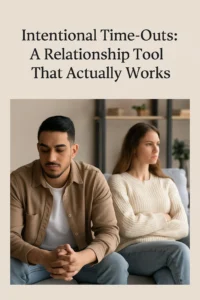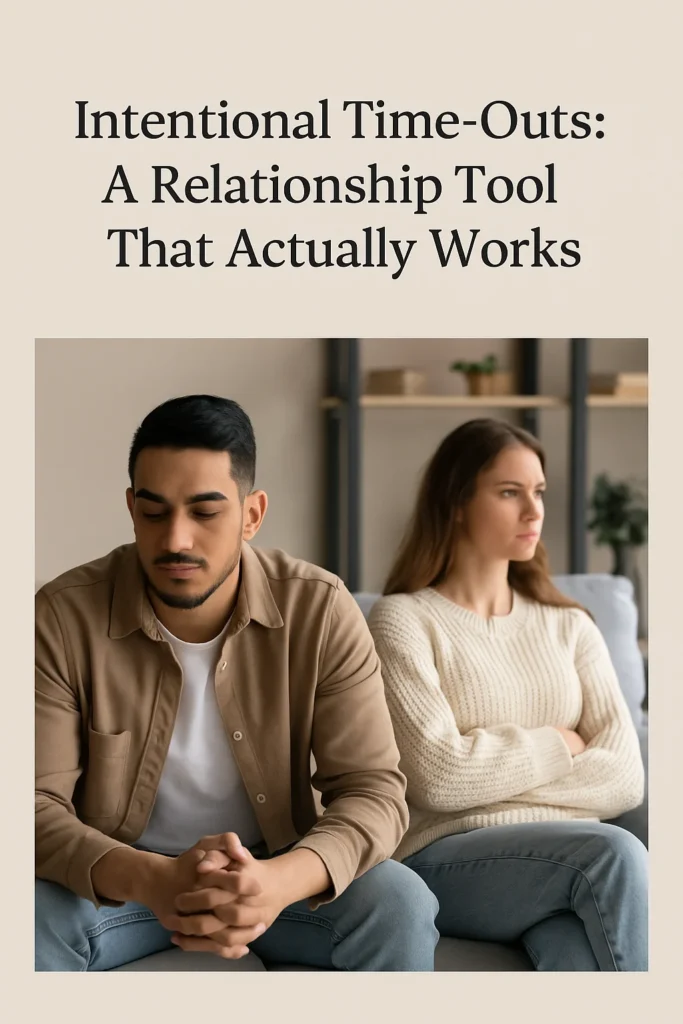
Arguments happen. No matter how in love you are, no matter how strong your connection may be, conflict is a natural part of every relationship. But how couples handle conflict is what makes or breaks emotional safety and long-term connection. It’s not about having a conflict-free relationship (that doesn’t exist)—it’s about learning how to repair when things get messy.
One tool that many couples overlook or misunderstand is the intentional time-out.
Not the dramatic kind where someone slams the door and disappears for hours. Not the “silent treatment” that leaves one person stewing while the other shuts down. I’m talking about a mutual, agreed-upon pause—used as a tool to calm the nervous system, gain clarity, and come back to the conversation with respect and intention.
Why Do We Need Time-Outs?
Let’s look at what actually happens during an argument.
When you and your partner are emotionally flooded—your heart is racing, your thoughts are spiraling, and you feel misunderstood or attacked—your brain isn’t in its logical, problem-solving state. It’s in survival mode. This is especially true if past trauma, attachment wounds, or deep insecurities are being activated.
In these moments, continuing the conversation often causes more harm than good. You might say something you don’t mean. You might shut down and go numb. You might become critical, defensive, or passive-aggressive.
And when both people are dysregulated, it’s like trying to drive a car with no brakes.
This is where a time-out can be one of the most loving things you offer—not just for yourself, but for your relationship.
What an Intentional Time-Out Actually Looks Like
An intentional time-out is not avoidance. It’s not walking away to punish your partner. It’s not giving up on the conversation.
It’s saying, “We matter too much for this to turn into something hurtful. Let’s pause and return to this when we’re grounded enough to really hear each other.”
Here’s how you can make it work in a healthy, effective way:
1. Recognize Your Signals
Everyone has signs they’re emotionally overwhelmed—tight chest, raised voice, clenched fists, tears, or feeling completely numb. Learn to identify your signals, and talk with your partner about theirs. The earlier you catch the signs, the better.
2. Use Clear Language
Instead of walking away mid-sentence, try saying:
“I’m starting to feel flooded. I want to have this conversation, but I need a break to calm down first.”
“Can we take a 30-minute time-out and come back to this?”
“I love you, and I don’t want to say anything I’ll regret. Let’s pause.”
This shifts the tone from defensiveness to collaboration.
3. Agree on the Return
Time-outs only work when you come back. Otherwise, it can feel like abandonment or shutdown. Set a timer, agree on a return time, and follow through. Even if you’re still upset when you return, it builds trust when you show up.
If you need more time? Say that. Just communicate it.
4. Use the Break Wisely
Don’t ruminate, rehearse your next argument, or replay the fight over and over. Instead, do something that helps you regulate:
Go for a walk
Journal how you’re feeling
Do some deep breathing or grounding exercises
Reflect on what triggered you and what you really want your partner to understand
Time-outs aren’t just physical breaks—they’re emotional resets.
5. Return with Intention
When you come back together, try to shift from blame to curiosity. Use “I” statements instead of “you” accusations:
“I realized I felt really dismissed earlier, and that made me shut down.”
“I want us to work through this, even though I still feel hurt.”
It’s okay if the issue isn’t fully resolved in one conversation. What matters is that you’re creating a pattern of turning toward each other instead of away.
Time-Outs Are a Team Strategy—Not a Personal Failing
So many couples resist time-outs because they feel like a loss or a sign of weakness. But in reality, taking a pause is one of the strongest things you can do. It shows emotional intelligence. It shows respect for the relationship. And it lays the groundwork for healthier communication moving forward.
No one gets this perfect. It takes practice. And it often takes learning how to soothe yourself in ways you may have never been taught growing up.
But couples who learn to implement time-outs with love and structure? They experience fewer explosive arguments, recover more quickly from conflict, and feel safer expressing their needs.
Ready to Learn New Tools for Your Relationship?
If you and your partner find yourselves stuck in the same cycles—or if conflict leaves you feeling disconnected, misunderstood, or emotionally raw—intentional time-outs might be the shift you need.
At Unwritten Chapters Counseling, I help couples just like you rebuild communication, reconnect emotionally, and navigate conflict with more grace. Whether you’re just starting your journey together or have been navigating challenges for years, you don’t have to figure it all out alone.
🌿 In-person therapy available in League City, TX
💻 Virtual therapy available across Texas
📞 Text or call 346-699-4880 to schedule an appointment
Let’s start rewriting your next chapter—together.




